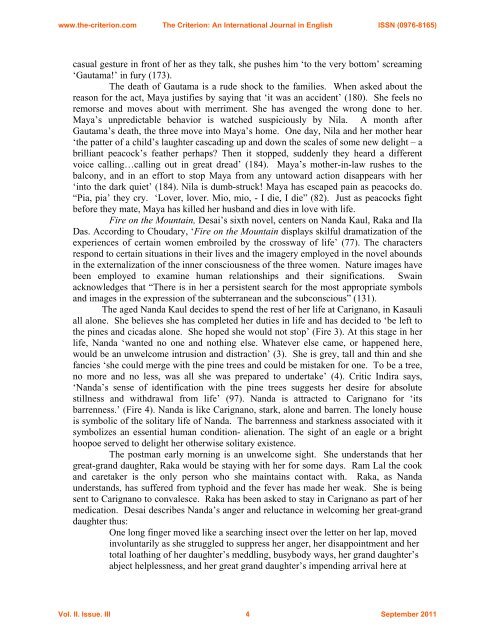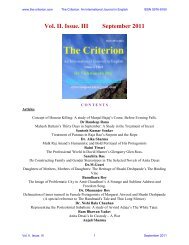Nature and Ecocriticism in Cry,The Peacock and Fire ... - The Criterion
Nature and Ecocriticism in Cry,The Peacock and Fire ... - The Criterion
Nature and Ecocriticism in Cry,The Peacock and Fire ... - The Criterion
Create successful ePaper yourself
Turn your PDF publications into a flip-book with our unique Google optimized e-Paper software.
www.the-criterion.com <strong>The</strong> <strong>Criterion</strong>: An International Journal <strong>in</strong> English ISSN (0976-8165)<br />
casual gesture <strong>in</strong> front of her as they talk, she pushes him ‘to the very bottom’ scream<strong>in</strong>g<br />
‘Gautama!’ <strong>in</strong> fury (173).<br />
<strong>The</strong> death of Gautama is a rude shock to the families. When asked about the<br />
reason for the act, Maya justifies by say<strong>in</strong>g that ‘it was an accident’ (180). She feels no<br />
remorse <strong>and</strong> moves about with merriment. She has avenged the wrong done to her.<br />
Maya’s unpredictable behavior is watched suspiciously by Nila. A month after<br />
Gautama’s death, the three move <strong>in</strong>to Maya’s home. One day, Nila <strong>and</strong> her mother hear<br />
‘the patter of a child’s laughter cascad<strong>in</strong>g up <strong>and</strong> down the scales of some new delight – a<br />
brilliant peacock’s feather perhaps? <strong>The</strong>n it stopped, suddenly they heard a different<br />
voice call<strong>in</strong>g…call<strong>in</strong>g out <strong>in</strong> great dread’ (184). Maya’s mother-<strong>in</strong>-law rushes to the<br />
balcony, <strong>and</strong> <strong>in</strong> an effort to stop Maya from any untoward action disappears with her<br />
‘<strong>in</strong>to the dark quiet’ (184). Nila is dumb-struck! Maya has escaped pa<strong>in</strong> as peacocks do.<br />
“Pia, pia’ they cry. ‘Lover, lover. Mio, mio, - I die, I die” (82). Just as peacocks fight<br />
before they mate, Maya has killed her husb<strong>and</strong> <strong>and</strong> dies <strong>in</strong> love with life.<br />
<strong>Fire</strong> on the Mounta<strong>in</strong>, Desai’s sixth novel, centers on N<strong>and</strong>a Kaul, Raka <strong>and</strong> Ila<br />
Das. Accord<strong>in</strong>g to Choudary, ‘<strong>Fire</strong> on the Mounta<strong>in</strong> displays skilful dramatization of the<br />
experiences of certa<strong>in</strong> women embroiled by the crossway of life’ (77). <strong>The</strong> characters<br />
respond to certa<strong>in</strong> situations <strong>in</strong> their lives <strong>and</strong> the imagery employed <strong>in</strong> the novel abounds<br />
<strong>in</strong> the externalization of the <strong>in</strong>ner consciousness of the three women. <strong>Nature</strong> images have<br />
been employed to exam<strong>in</strong>e human relationships <strong>and</strong> their significations. Swa<strong>in</strong><br />
acknowledges that “<strong>The</strong>re is <strong>in</strong> her a persistent search for the most appropriate symbols<br />
<strong>and</strong> images <strong>in</strong> the expression of the subterranean <strong>and</strong> the subconscious” (131).<br />
<strong>The</strong> aged N<strong>and</strong>a Kaul decides to spend the rest of her life at Carignano, <strong>in</strong> Kasauli<br />
all alone. She believes she has completed her duties <strong>in</strong> life <strong>and</strong> has decided to ‘be left to<br />
the p<strong>in</strong>es <strong>and</strong> cicadas alone. She hoped she would not stop’ (<strong>Fire</strong> 3). At this stage <strong>in</strong> her<br />
life, N<strong>and</strong>a ‘wanted no one <strong>and</strong> noth<strong>in</strong>g else. Whatever else came, or happened here,<br />
would be an unwelcome <strong>in</strong>trusion <strong>and</strong> distraction’ (3). She is grey, tall <strong>and</strong> th<strong>in</strong> <strong>and</strong> she<br />
fancies ‘she could merge with the p<strong>in</strong>e trees <strong>and</strong> could be mistaken for one. To be a tree,<br />
no more <strong>and</strong> no less, was all she was prepared to undertake’ (4). Critic Indira says,<br />
‘N<strong>and</strong>a’s sense of identification with the p<strong>in</strong>e trees suggests her desire for absolute<br />
stillness <strong>and</strong> withdrawal from life’ (97). N<strong>and</strong>a is attracted to Carignano for ‘its<br />
barrenness.’ (<strong>Fire</strong> 4). N<strong>and</strong>a is like Carignano, stark, alone <strong>and</strong> barren. <strong>The</strong> lonely house<br />
is symbolic of the solitary life of N<strong>and</strong>a. <strong>The</strong> barrenness <strong>and</strong> starkness associated with it<br />
symbolizes an essential human condition- alienation. <strong>The</strong> sight of an eagle or a bright<br />
hoopoe served to delight her otherwise solitary existence.<br />
<strong>The</strong> postman early morn<strong>in</strong>g is an unwelcome sight. She underst<strong>and</strong>s that her<br />
great-gr<strong>and</strong> daughter, Raka would be stay<strong>in</strong>g with her for some days. Ram Lal the cook<br />
<strong>and</strong> caretaker is the only person who she ma<strong>in</strong>ta<strong>in</strong>s contact with. Raka, as N<strong>and</strong>a<br />
underst<strong>and</strong>s, has suffered from typhoid <strong>and</strong> the fever has made her weak. She is be<strong>in</strong>g<br />
sent to Carignano to convalesce. Raka has been asked to stay <strong>in</strong> Carignano as part of her<br />
medication. Desai describes N<strong>and</strong>a’s anger <strong>and</strong> reluctance <strong>in</strong> welcom<strong>in</strong>g her great-gr<strong>and</strong><br />
daughter thus:<br />
One long f<strong>in</strong>ger moved like a search<strong>in</strong>g <strong>in</strong>sect over the letter on her lap, moved<br />
<strong>in</strong>voluntarily as she struggled to suppress her anger, her disappo<strong>in</strong>tment <strong>and</strong> her<br />
total loath<strong>in</strong>g of her daughter’s meddl<strong>in</strong>g, busybody ways, her gr<strong>and</strong> daughter’s<br />
abject helplessness, <strong>and</strong> her great gr<strong>and</strong> daughter’s impend<strong>in</strong>g arrival here at<br />
Vol. II. Issue. III 4 September 2011

















